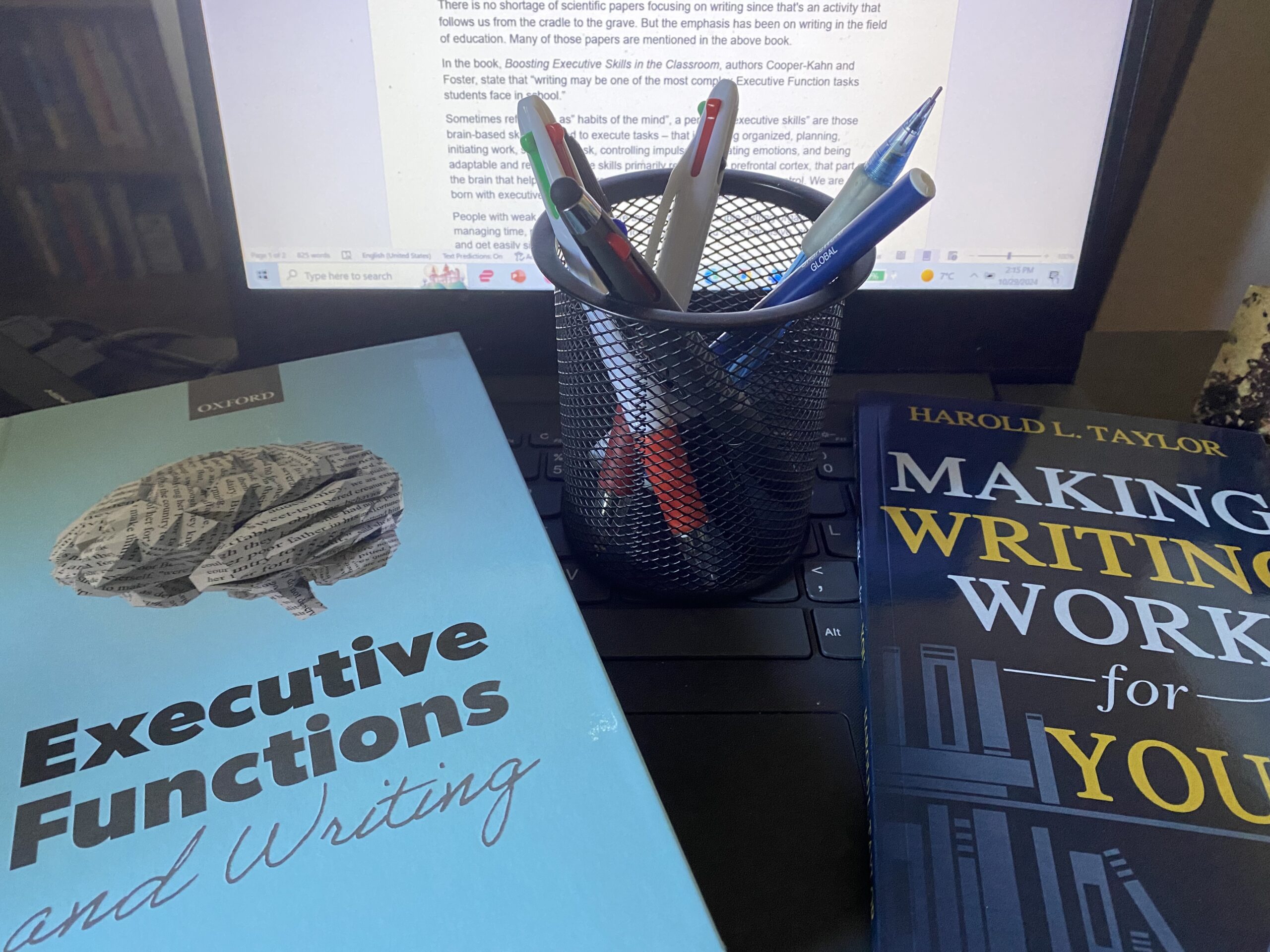The role of executive skills in writing
According to the book, Executive Functions and Writing, edited by Teresa Limpo and Thierry Olive, executive function skills have been researched extensively during the past three decades. And between 2010 and 2019, there were 30,787 papers published. There is no shortage of scientific papers focusing on writing since that’s an activity that follows us from the cradle to the grave. But the emphasis has been on writing in the field of education. Many of those papers are mentioned in the above book.
In the book, Boosting Executive Skills in the Classroom, authors Cooper-Kahn and Foster, state that “writing may be one of the most complex Executive Function tasks students face in school.”
Sometimes referred to as” habits of the mind”, a person’s “executive skills” are those brain-based skills required to execute tasks – that is, getting organized, planning, initiating work, staying on task, controlling impulses, regulating emotions, and being adaptable and resilient. These skills primarily reside in the prefrontal cortex, that part of the brain that helps you manage complex problems, goals and self-control. We are all born with executive skills; but they take about twenty years to fully develop.
People with weak executive skills are those who have trouble getting organized, managing time, planning and staying focused. They tend to be impulsive, procrastinate, and get easily sidetracked.
If a child had these characteristics they would probably be diagnosed as having ADHD. Many researchers believe that ADD and ADHD are disorders of executive skills. All agree that if the child has ADHD, at least some executive skills will be impaired, such as the ability to pay attention and stay focused and stick to one task for any length of time.
The female brain is smaller, but the prefrontal cortex matures about two years earlier, giving girls an advantage when it comes to executive skills such as sustained attention, self-regulation and emotional control. This could be the reason why nine boys are referred to medical clinics for behavioral problems for every girl – and why boys are three times more likely to be diagnosed with ADHD.
If your son or daughter drives you crazy with their reluctance to get up and at it in the mornings, or forever put off cleaning their room, it could be that you are strong in those executive skills. That’ probably why it bugs you so much.
In business, it’s not unusual for executives to hire an assistant who has the strengths that he or she lacks. In the same way, your writer’s group members may have different strengths than you have and could help you with editing or solving a problem with inconsistency in a character’s thinking. That’s another advantage of joining at least one writer’s group.
The potential for these executive skills is hardwired into your brain at birth, but the strength of each one as you age is determined by your upbringing, experiences, environment, and training. You can also inherit certain strengths or intentionally develop them. As it is with most strengths, you either use them or lose them.
Different skills develop at different times, but growth is fastest during the infant and toddler years. They are not fully developed for 20 years or so – the last areas of the brain to fully develop. That’s why teens may act irrationally and drive you crazy sometimes.
The skills affected could vary but most researchers who focus on executive function agree that they involve a group of cognitive processes that allow individuals to successfully engage in independent, purposeful, and self-directed behaviors. And yes, ADHD could be diagnosed in adults as well.
These skills are called for in tasks where success depends upon an individual being capable of sustaining attention, manipulating ideas, resisting temptations, thinking before acting, and/or dealing with unanticipated challenges. Those strengths could be an asset for writers of any genre.
Executive functions or skills are necessary for everyday life, not just for managers, students, or writers. Weaknesses in any of these skills or functions make it difficult for the individual, regardless of their age or vocation.
In my latest book, Making Writing Work for You, I review the 12 executive skills, their definitions, and an example or two of how they might impact authors and writers. The skills that I mention there are from the book Work Your Strengths, by Guare, Dawson and Martin. That book does not focus on strengthening the skills as much as it does on matching your stronger skills with jobs that require those skills.
In my book, I suggest a few strategies for improving each of the 12 skills mentioned in the Work Your Strengths book and some advice for writers. If you want to study them in more depth, there are also several books listed in the references that discuss executive functions.
To review and/or purchase my book, please click on the following Genius link: https://geni.us/6YkFpqf


Recent Comments